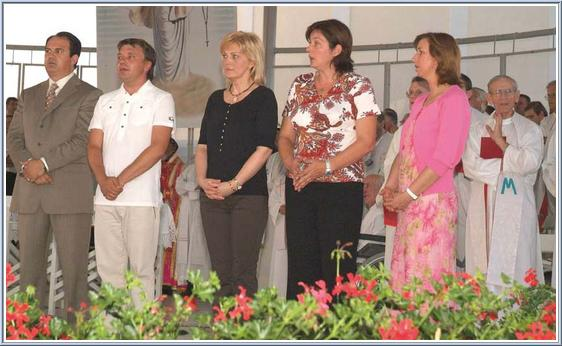
The informative web site Petrus (www.papanews.it), directed by Gianluca Barile, is looking ahead at the work of the investigating Commission on the phenomena of Medjugorje.
To summarize: Official meetings of the new commission will begin after the summer, with the six visionaries summoned to Rome for interviews. Petrus expects that they will be asked to disclose the ten "secrets" which they have refused to give up in previous investigations. The article also reports a suggested compromise idea floated in Rome: that CDF could reject the claims of an apparition, but grant approval to the messages (thousands of them?) as "interior locutions". Is it just a last-ditch attempt to salvage the phenomenon?
Related link:
My translation of the article follows.
Trickery, interior locutions, or apparitions? The 'seers' of Medjugorje will have to report to the Ruini Commission and submit the ten secrets received (?) from the 'Gospa'
VATICAN CITY - Vicka Ivanković, Mirijana Dragičević, Marija Pavlović, Ivan Dragičević, Ivanka Ivanković and Jakov Čolo, the famous pseudo-seers of Medjugorje, will have to report to the Vatican, probably right after the summer, to respond to questions from the Commission of inquiry - instituted by Benedict XVI, under the presidency of Cardinal Camillo Ruini - assigned to shed light on the alleged Marian apparitions that they have reportedly witnessed uninterruptedly since June 24, 1981. At the same time, the six will be called on to submit to that body, created at the Pope's will, the ten secrets which the Madonna is said to have entrusted to them.
Official meetings have not started yet, but the tendency among the members of the Commission is to meet and 'interrogate' the protagonists of that bruited event in person. The Commission, which took office last March and is eagerly at work to shed light on the supernatural events that call millions of pilgrims from all over the world to the little town of Bosnia-Herzegovina, has already been informed by the Bishop of Mostar on the disobedience of the pseudo-seers to local ecclesiastical authority. Casting shadows on the apparitions, notoriously, are the theological inconsistency of the messages, their contradictions, and the infinite number of the apparitions.
Besides Cardinal Ruini, participants in the Commission are the Cardinals Juliàn Herranz, Jozef Tomko, Vinko Puljic and Josip Bozanić; the Prefect of the Congregation for the Causes of Saints, Monsignor Angelo Amato; Monsignor Tony Anatrella, psychoanalyst and specialist in social psychiatry; Monsignor Pierangelo Sequeri, Lecturer in Fundamental Theology at the Theological Faculty of Northern Italy; Fr. A. David Maria Jaeger, Consultor for the Pontifical Council for Legislative Texts; Fr. Józef Kijas Zdzislaw, Relator of the Congregation for the Causes of Saints; Fr. Salvatore M. Perrella, Lecturer in Mariology at the Pontifical "Marianum" Theological Faculty; the Rev. Achim Schütz, Lecturer in Theological Anthropology at the Pontifical Lateran University (in the role of secretary) and Monsignor Krzysztof Nykiel, official of the Congregation for the Doctrine of the Faith (in the role of assistant secretary). When the Ruini Commission has completed its investigations and expressed its own opinion, it will report to the Congregation for the Doctrine of the Faith, from which the final word is expected.
The establishment of the Commission represents an exception in the history of the Church, in consideration of the complexity of the phenomena that are allegedly happening at Medjugorje. It is naturally too soon yet to know or foresee what the Vatican will ratify in its regard, but in the 'Sacri Palazzi', many among the Cardinals and Bishops of the Curia are certain that at the end the Holy See may recognize these events 'only' as interior locutions of the seers and not as true and proper apparitions. In that way, the pilgrims would be able to continue to go to the little town in Bosnia-Herzegovina to venerate the 'Gospa' (as they call the Virgin there), knowing well, however, that our heavenly Mother is not appearing in that place.

